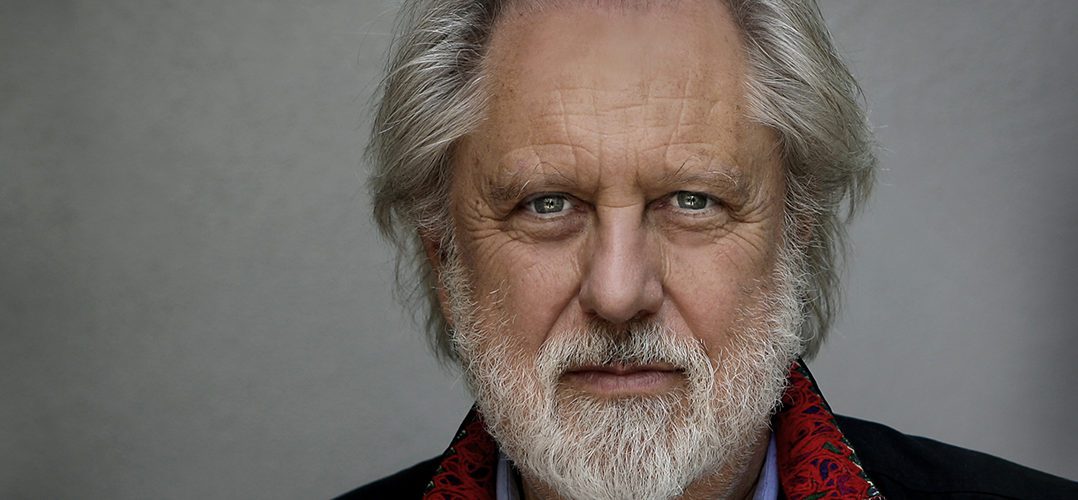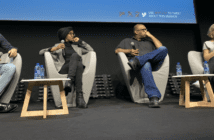British filmmaker, educator and Labour peer Lord David Puttnam and the dean of screen at the London College of Communication, UAL, Larra Anderson, presented a new educational initiative for the screen industries at MIPCOM.
Leading to an executive MBA (EMBA), the course embraces film, television, animation, post-production, visual effects, sound and music for the moving image, games and immersive realities.
Speaking to MIPCOM News, Puttnam said his early experiences in the industry fueled his desire to establish the initiative. “I actually went to night school at the London College of Printing for four years [now the London College of Communication, a part of UAL]so there are romantic attachments to this.” He later took a year out to study copyright law which turned out to be “the greatest investment” he ever made. “After that I never felt embarrassed in front of a lawyer. To have that kind of understanding is worth everything when you are in a negotiation.”
The problem for creative people, Puttnam said, is that “if you have great talent, if you have great ideas, the last thing you want to be is a suit. But if you don’t understand a balance sheet you can lose out.”
Resilience is important too. “Always have a plan B, because it helps you deal with disappointment and disappointment happens all the time. If you’re in a negotiation and you know there’s an alternative, it makes you stronger and it shows.”
The creative industries have always been “management-light”, he said. “From small animation companies to film production companies to companies that thought they could make a killing with Amazon and Netflix – even some of the small companies in the fast-growing SFX businesses – they can all face the same problem: an inability to manage growth.” Which is where the EMBA can play a role. “My dream candidate is someone who has worked in a small business, is spotted by the owners as having talent and is given time off to develop management skills. It certainly helped me.”
The EMBA also addresses the multiplatform nature of today’s industry, something Puttnam was speaking publicly about as far back as 1981.
“A lot of businesses are narrowly structured,” he said. “There are some that only ever made one series or even just one documentary. I would love to emerge from this, savvy men and women who can look sideways and build a broader base, so when there is a problem they can diversify.” And who are looking far into the future: “I’m 77 years old – understand that you are in it for the long haul. You want to be doing some interesting stuff in 30 years’ time. It doesn’t occur to many that this is a long-term business.”
Puttnam became an international name early in his career, as producer of the 1981 movie Chariots Of Fire for which he won the Best Picture Oscar, one of the film’s four Academy Awards. But if film was his first love he is acutely aware of the free flow of talent between cinema and TV and across international borders that is sustaining television’s seemingly endless Golden Age – something he maintains his native UK has enjoyed for decades.
“We have always had a huge advantage over the Americans in this regard,” he said. “Take acting – and I’m talking about as far back as the 1970s. A good actor could move seamlessly from TV to film to stage and record a voiceover for a commercial or a documentary and nobody ever thought anything less of them. Think of Roger Moore or Jeremy Irons.
That was very uncommon in America where for years you only did one thing,” he said. “While crossing over was always extremely common to our experience.”
So what are some of Lord Puttnam’s observations of today’s barrier-free audiovisual landscape, where disruption of old models is the norm?
“Well, one is that data-driven decision making – algorithms that tell us what programmes to make – that is not going to lead to excellence. Algorithms can’t spot creativity and won’t produce better TV, because they work backwards.”
Another is “how fine the line is between excellence and not particularly good. We all know just how good The Crown was, and now we are seeing knock-offs and actually they are not good. The fine line between excellence and OK is critical, so it’s important to keep people’s heads up and maintain an understanding of what excellence is.”
This and more in the MIPCOM News Issue two, read it in full here…
This article was written by Jo Stephens and edited for MIPBlog.




